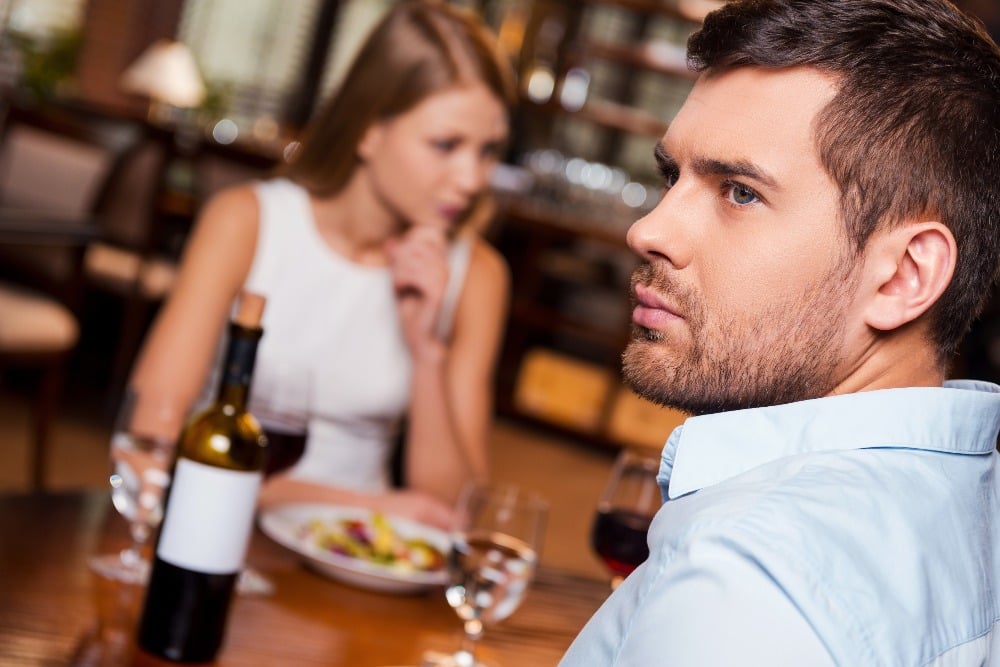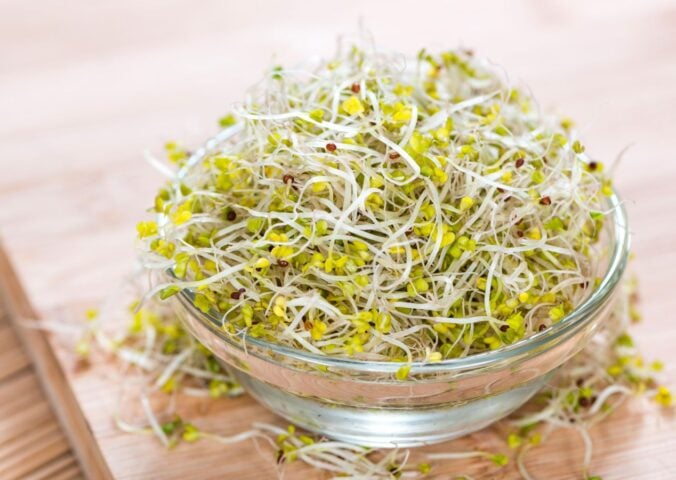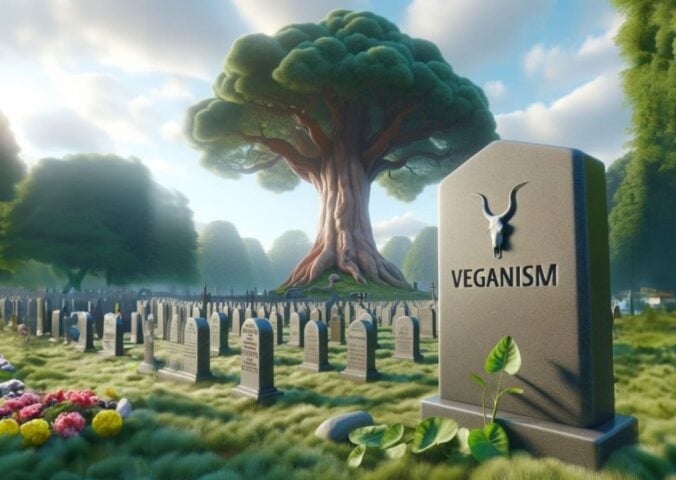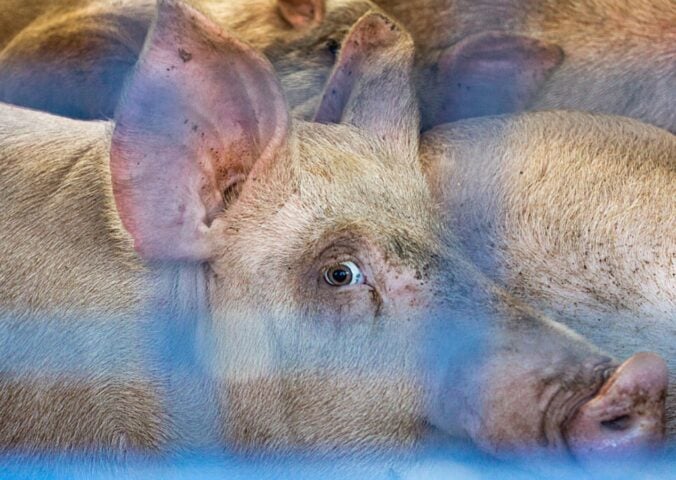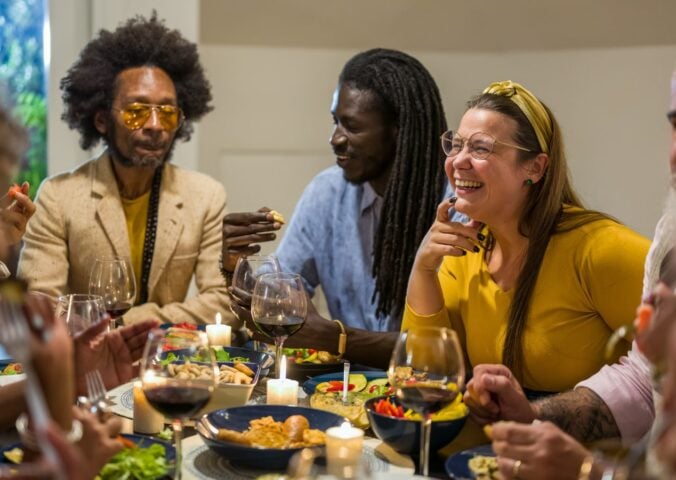A few weeks ago I visited a dairy farm as research for a new book. Each chapter is centred around a meal between myself (the vegan) and someone who works within traditional farming, animal entertainment or animal use industries.
The visit was in many ways harrowing: seeing a day-old baby calf in a pen, separated from his mother, this one to be raised for beef; seeing other male ‘bobby’ calves between days and weeks old, penned by age, many just hours or days away from death because, as male calves in the dairy industry, they are ‘useless’ and worth more dead than alive.
Eating with farmers
But what wasn’t difficult was the interaction with the farmer and his family. They were polite, interesting, hospitable, left-wing, anti-Brexit, did voluntary work for their friends and community – and made a fully vegan lunch to share. They even went and found some of the best vegan ice cream I’ve ever tasted for dessert. They admitted they aren’t your regular dairy farming family. But even so, they were nice people. It would be easier if they weren’t.
They were more worried about me than I was about them – they thought I might be there as a journalist to do a hatchet job on their lifestyle; or that I was one of these vegan activists who threaten farmers with violence.
Sharing meals
Part of my book project is to make work that shows how patient, reasonable and kind even committed vegan activists can be. (We know this already; but of course the media is keen to portray vegan advocates as militant and ‘the enemy’ to sell their papers and ad space.)
I chose to centre the conversations around a shared meal because, as most vegans and vegetarians already know, the shared meal is the site of the most regular and complicated conflicts between veg*ns and their loved ones.
Veganism is more than just a food practice. But there’s nowhere that the relationships between vegans and carnists is played out more painfully than in the sharing of what carnists see as ‘food’ and vegans see as abuse. Preparing and sharing food is a, if not the, fundamental grouping practice of social life. We all do it. And we all want to do it. Food is the most common excuse for families, friends and even enemies to come together.
But there are many vegans who have chosen not to bystand the violence perpetrated against victims of the animal agriculture industry. Many choose not to sit and eat with anyone who is consuming the bodies of animals or their secretions. Some choose not to even go into places where such violence is normalized, such as your average everyday restaurant.
Taking the Pledge
And some have made the choice public via The Liberation Pledge.
The Liberation Pledge asks people to show respect for victims of violence, and demonstrate against the brutal system of animal exploitation, by refusing to ‘sit at a table where a victim’s body is being eaten’.
The action takes historical precedents, such as the pledge made in Japan by families to eradicate the horrors of foot binding, as evidence for the ways in which public assertions of actions work. People who’ve taken the pledge are encouraged to wear a fork bracelet as a means to signify their commitment – and to spark conversation.
The ethos, and the language, of the pledge are wholly commensurate with my beliefs and feelings about our treatment of nonhuman others. While wanting to avoid victimizing all animals, it is undoubtedly true that animals who have been trapped in the violent human food system are victims – and the evidence is their bodies on our plates.
??You wouldn’t eat a pet
Many of my friends have taken it. Many of the most thoughtful, caring and active of the advocates I know within the movement have taken it. As Mark Westcombe of the Animal Think Tank says: “The Liberation Pledge was important to me for two reasons. My social crowd all challenge sexism, homophobia and other isms, so for me to be consistent as an anti-speciesist and do the same as I do with other -isms I had to challenge speciesism, and that meant asking those around me not to eat animals in my company.
“And because I realized we all do it a bit already, none of us would stick around if someone was eating a ‘pet’, so how could it be ok to stick around when someone ate another animal?”
It has made Mark’s life easier and less complicated, he says, with less confrontation. Here’s the letter he wrote to friends and family explaining his reasons.
So why haven’t I taken the pledge?
Meeting people where they’re at
The main reason is that my family life is not in a place to make the pledge without disrupting relations that are, in some ways, only now, at the ripe old age of 44, becoming stable.
As someone who grew up with an alcoholic father, who has been a missing person for 10 years, and a mother who was chronically ill for 20 years before passing away, I did my very best to cut myself off from the traumatic experiences of family. And I inherited from my mother, who was both an overweight diabetic and who worked at Nestle and brought home bags of chocolate, my own mild eating disorders around food, especially comfort eating.
After a few years of therapy, I’m rebuilding those relationships. That includes spending more time with the family who are left, sitting down and eating with family members who just do not get veganism at all; and others who are suffering from chronic health conditions which makes any ‘restrictions’ on diet difficult. When I step into their house, who am I to tell them I’m not going to sit and eat with them? And I don’t want to cause any more hurt.
Even though that is exactly what many people who have taken the pledge have done – and with inspiring results that have often brought families closer together.
Just excuses?
So are these my justified reasons, or just well-dressed up excuses?
Perhaps. But the compassionate course of activism is always to try and understand where people are at in their lives, and meet them there. And that goes for those of us who are already working as advocates for animals. Our life histories and complexities matter. Not everyone has the capacity to bear witness. Perhaps not everyone has the capacity to take the pledge – even when they know they ‘should’.
It is a difficult decision. I comfort myself with knowing I work for animals in other ways. And yet… to see the victim of abuse on a plate is to bystand that moral crime. How can I justify that? It isn’t only family comfort of course – we are social beings, hardwired to want to be part of social groups. Which is why finding a vegan tribe can be so important.
Pledge where you can
So because I agree with it, I enact the pledge where I can. In my workplace, I choose not to sit and eat with colleagues where animals’ bodies are being eaten. If non-vegan friends ask me if it bothers me if they eat animal bodies, I say yes.
And at the annual summer barbecue, when the ‘food’ is ready and the party sits down to eat I then go and take my plate into a different room. Sometimes others come in and find me and ask what I’m doing. And if they ask, I tell them.
I’m hoping my interview subjects for the book are as hospitable as the farmers if they cook for me, otherwise I’m going to go hungry! And if they cook vegan for me but ‘meat’ for themselves I know how difficult that will be. But even though I completely agree with the Liberation Pledge as an action, I’m not able to take it – yet. For this book, there is still benefit from sitting down to eat with carnists.
Will I ever be ready? I’m hoping I never have to be: that the world becomes vegan-first by default, where it is the carnist who has to ask for the special menu, who pays a premium for milk that comes with violence, and who is stigmatised for their ecologically destructive tastes.
But I do support those who’ve taken the Pledge. There’s a Facebook group you can join too, for information and support. Have you taken the pledge yet?
